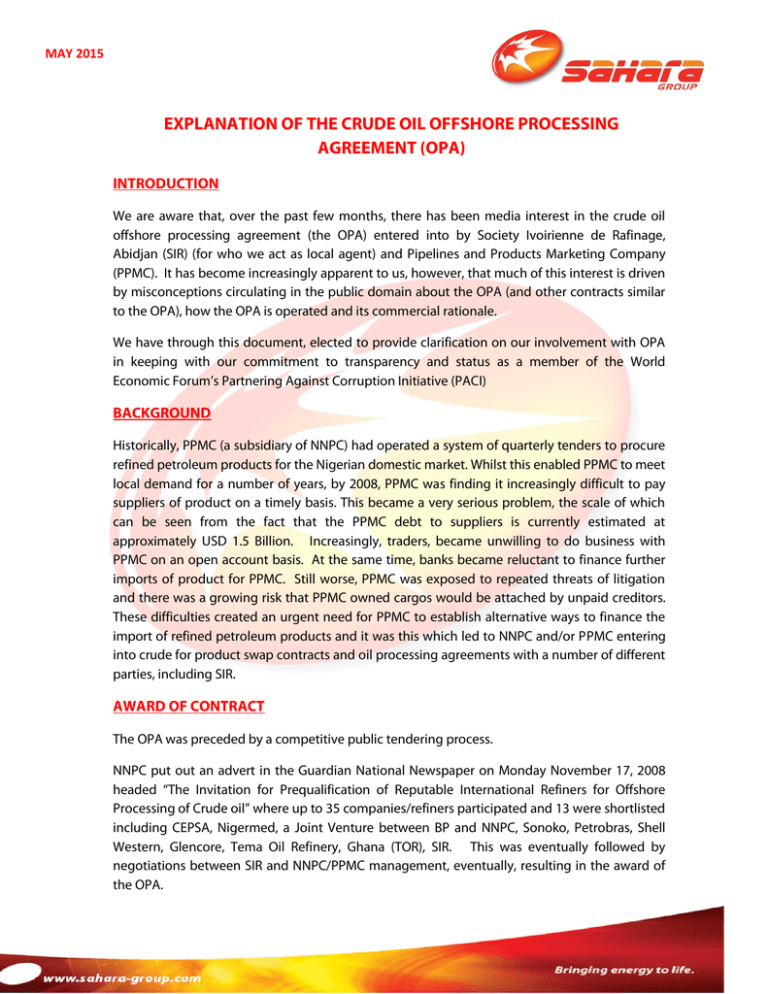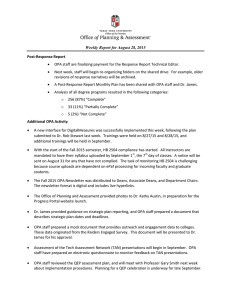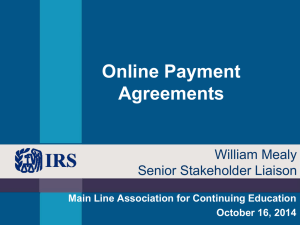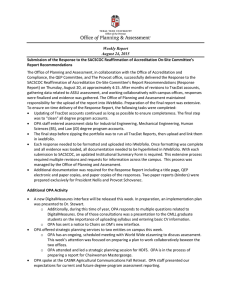opa - Sahara
advertisement

MAY 2015 EXPLANATION OF THE CRUDE OIL OFFSHORE PROCESSING AGREEMENT (OPA) INTRODUCTION We are aware that, over the past few months, there has been media interest in the crude oil offshore processing agreement (the OPA) entered into by Society Ivoirienne de Rafinage, Abidjan (SIR) (for who we act as local agent) and Pipelines and Products Marketing Company (PPMC). It has become increasingly apparent to us, however, that much of this interest is driven by misconceptions circulating in the public domain about the OPA (and other contracts similar to the OPA), how the OPA is operated and its commercial rationale. We have through this document, elected to provide clarification on our involvement with OPA in keeping with our commitment to transparency and status as a member of the World Economic Forum’s Partnering Against Corruption Initiative (PACI) BACKGROUND Historically, PPMC (a subsidiary of NNPC) had operated a system of quarterly tenders to procure refined petroleum products for the Nigerian domestic market. Whilst this enabled PPMC to meet local demand for a number of years, by 2008, PPMC was finding it increasingly difficult to pay suppliers of product on a timely basis. This became a very serious problem, the scale of which can be seen from the fact that the PPMC debt to suppliers is currently estimated at approximately USD 1.5 Billion. Increasingly, traders, became unwilling to do business with PPMC on an open account basis. At the same time, banks became reluctant to finance further imports of product for PPMC. Still worse, PPMC was exposed to repeated threats of litigation and there was a growing risk that PPMC owned cargos would be attached by unpaid creditors. These difficulties created an urgent need for PPMC to establish alternative ways to finance the import of refined petroleum products and it was this which led to NNPC and/or PPMC entering into crude for product swap contracts and oil processing agreements with a number of different parties, including SIR. AWARD OF CONTRACT The OPA was preceded by a competitive public tendering process. NNPC put out an advert in the Guardian National Newspaper on Monday November 17, 2008 headed “The Invitation for Prequalification of Reputable International Refiners for Offshore Processing of Crude oil” where up to 35 companies/refiners participated and 13 were shortlisted including CEPSA, Nigermed, a Joint Venture between BP and NNPC, Sonoko, Petrobras, Shell Western, Glencore, Tema Oil Refinery, Ghana (TOR), SIR. This was eventually followed by negotiations between SIR and NNPC/PPMC management, eventually, resulting in the award of the OPA. MAY 2015 Sahara, who is a shareholder in SIR, has had a very successful trading relationship with SIR for over a decade. Sahara is one of SIR's major suppliers of crude oil and purchaser of refined petroleum products and, indeed, it was Sahara that introduced SIR to the opportunity of participating in the NNPC tender. THE OPA The OPA is a contract by which PPMC agrees to deliver crude oil in consideration for SIR delivering refined products to PPMC in accordance with contractually defined processing yields applicable to the relevant grade of crude oil. It should be noted that much of the OPA is constituted by standard terms that were included at the insistence of PPMC/NNPC and which reflect their existing practice. As far as the contractual yields are concerned, these were defined following detailed commercial negotiations which took into account a large number of factors including the value on the international market of the different grades of crude oil that could be made available by PPMC, the yields that could be achieved from refining those grades of crude oil at various refineries as well as the yield that is achievable by SIR, the cost of the refining process and the cost of transportation to and from the refinery. CRUDE ALLOCATIONS All crude oil allocations to SIR under the OPA were strictly as per the terms of the OPA and were, always, subject to availability and, strictly, at NNPC’s discretion. PRODUCTS DELIVERY All refined products delivered under the OPA were as specified in the OPA and benchmarked against the negotiated and approved yields. The OPA defines precisely what quantities of refined products are to be supplied for each type of crude oil lifted and these typically include gasoline and dual purpose kerosene. Automotive Gas Oil is rarely requested by PPMC as it is already a de-regulated product. SECURITY It is to be noted that the OPA stipulates that a standby letter of credit covering the value of the crude oil to be lifted must be opened before lifting, and stands as security in event of a default by SIR. Accordingly, PPMC is fully secured under the OPA. PRODUCT SPECIFICATIONS The detailed specifications for all products to be delivered are set out in the OPA and are in line with those that PPMC has always used when importing product. MAY 2015 These specifications are also in line with specifications approved by the department of Petroleum Resources (DPR) and the Products Petroleum Regulation Authority (PPRA). We are aware of speculation that off specification products have been supplied under OPA in order to maximize profits for SIR. This is not only untrue, but such speculation reveals a fundamental misunderstanding of the OPA and how it operates. There are multi layered quality assurance and control procedures in place. These include selfimposed quality and quantity certification at loading, further inspections enroute and at arrival at the discharge port. On arrival, there are quality and quantity inspections by PPMC and further quality and quantity inspections by DPR before discharge. Further, when cargoes are discharged by PPMC direct to some of the major oil marketing companies and/or third party depots where product is stored, there is almost always another round of quantity and quality inspections. In some instances, such as for example in the case of Dual Purpose Kerosene (DPK), these checks are repeated on multiple occasions by the final receivers of the product. All of these quality and quantity certifications are carried out by internationally qualified and certified inspection companies and all samples are kept for a minimum period of six months. Furthermore, delivery of an off-spec product would constitute a breach of the OPA and this would lead to claims by PPMC/NNPC against SIR. There is, therefore, no sense in which SIR could ever hope to gain any sort of commercial advantage by delivering off-spec product OPERATIONAL CONSIDERATIONS AND LOGISTCS We are also aware of speculation about why it is that not all crude oil that is lifted by SIR under the OPA is destined for SIR. Again, such speculation betrays a fundamental misunderstanding of not only the underlying commercial purpose of the OPA but also, of the complexities of operating a refining business. As already stated above, the primary commercial purpose of the OPA was to provide PPMC with an alternative means of funding the import of refined product into Nigeria. This purpose is satisfied when SIR delivers the refined product that it has contracted to supply. Whether that product is obtained by processing the crude oil delivered by PPMC at SIR or from some other source is irrelevant and SIR's decision making in this regard is impacted by numerous factors including international prices of crude oil and refined products, freight rates, the refineries refining capacity, the refining margin being achieved by other international refineries, arbitrage or pricing anomalies in crude and product markets in different geographical locations, the world supply and demand for crude and refined products and also the forward theoretical pricing for products and crude. MAY 2015 PRODUCT SUBSTITUTIONS AND PRE-DELIVERIES Another area of speculation of which we are aware relates to the pricing which is applied in cases of product substitution and pre-delivery. Both product substitution and pre-delivery of product occur because of requests emanating from PPMC. Neither is driven by SIR and both are provided for the convenience and benefit of the Nigerian public. Product substitution occurs when PPMC requests that a different mix of product is delivered to that originally requested. This, typically, arises if PPMC determines that existing stock levels in the country are such that a different import priority needs to be applied. Should such a situation arise, the parties apply contractually defined OPA conversion formulae to determine the exact volume of ‘Substitute Products’ to be delivered for the particular grade of crude oil that has been supplied. Pre-delivery of product, on the other hand, occurs when PPMC requires that product be delivered even though it has, for whatever reason, been unable to supply the agreed number of barrels of crude oil for lifting by the product supplier in any given OPA cycle. What this means is that refined product has to be delivered by the supplier before that supplier takes delivery of the crude oil to which it is entitled under the OPA. This is known as a 'pre-delivery'. Proceeding by way of pre-delivery is much more expensive for product suppliers such as SIR because it exposes them to significantly higher financing costs. This is primarily because they are not in a position to offer the crude oil as security for the financing and must by necessity, bridge the costs. DEMURRAGE We note that there has also been speculation that vessels delivering refined products under the OPA have been intentionally delayed so as to generate additional profit by way of demurrage. This, too, is untrue and is another example of speculation based on a fundamental misunderstanding of how the OPA operates. The OPA defines how demurrage is to be calculated, and demurrage rates applicable under the OPA are, generally, lower than the actual demurrage rates incurred by suppliers when chartering vessels. This is because demurrage rates under the OPA are based on a TD5 demurrage report, (which uses historical average demurrage rates for various sizes of vessel over specific periods of time) and these rates are almost always lower than the actual demurrage rates paid by suppliers when chartering in tonnage. The reality, therefore, is that the supplier of product under the OPA gains no financial advantage by incurring demurrage. On the contrary. MAY 2015 Furthermore, if the vessel arrives late and outside of the agreed delivery window, then all waiting time is on the account of the supplier and no demurrage will be paid by PPMC, regardless of how long the vessel waits to discharge until the vessel is all fast at the jetty. The other point to bear in mind is that, once the vessel has tendered its notice of arrival and readiness to discharge, it is then under the full control of the supply and distribution department of PPMC which is the final authority in programming vessels for discharge and determines where and when the vessels will discharge. The supplier has no say whatsoever in where or how long it takes the vessel to discharge. Accordingly, not only is it the case that the supplier gains no financial advantage from demurrage but, it is entirely in PPMC's power to determine when the vessel will discharge and to, thus control any exposure to demurrage. OPA ACCOUNT RECONCILIATION The OPA provides for periodic account reconciliation on each and every amount receivable and/or payable between the parties at periodic intervals. At these reconciliations, all parties are present and all components of the OPA for the reconciliation period are fully reconciled between the parties to ensure that each party has fulfilled their obligations under the OPA. .


